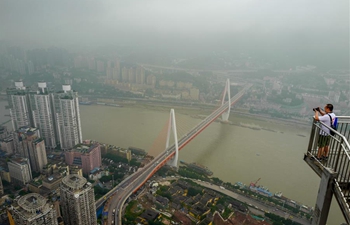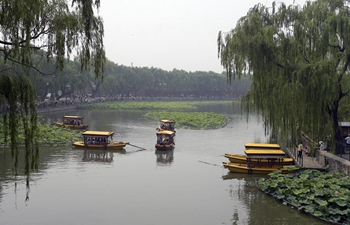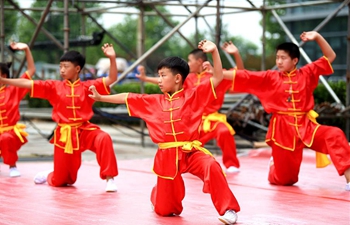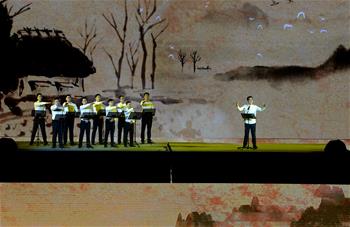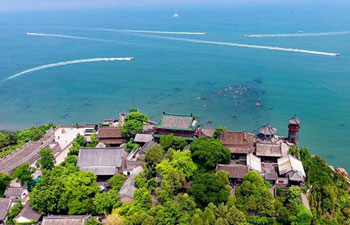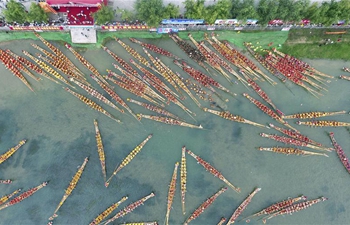
People take part in a dragon boat race to celebrate the Dragon Boat Festival at Nanhu Park in Huaibei City, east China's Anhui Province, June 18, 2018. Dragon boat race is a traditional event for the Dragon Boat Festival, which falls on the fifth day of the fifth month of the Chinese lunar calendar, or June 18 this year. (Xinhua/Wan Shanchao)
BEIJING, June 18 (Xinhua) -- Athletes on two dragon boats paddled vigorously through a paddy field in unison to the beat of drums, covering a distance of 100 meters before reaching the finish line.
This dragon boat race was held by members of Xibe ethnic group in a township in northeast China's Liaoning Province to mark the Dragon Boat Festival which falls on Monday this year.
The festival, also called the Duanwu Festival, is traditionally celebrated on the fifth day of the fifth month on Chinese lunar calendar.
"Paddling in the mud consumes more energy than in the river. It's tiring but also very interesting," an athlete said.
Liu Chunli, researcher with a Shenyang-based institute on the Xibe ethnic group, said that Xibe people pick a handful of young crops at a worship ceremony and hang a ball-shaped bundle of red ribbons on the dragon's head, praying for a good harvest.
The athletes are either local villagers or tourists. "I've seen lots of dragon boat races on the river or lake, but it is my first time to see the boats on the mud," said Zhang Yun, a tourist from Shenyang.
Chinese get a three-day break from work on the holiday, and many like Zhang choose to travel.
It puts pressure on transport infrastructure. China will see 47 million trips made by rail from Friday to Monday, said state-owned railway operator China Railway. Daily trips are expected to hit 11.75 million, a year-on-year increase of 7.8 percent.
Cities such as Beijing, Dalian, Qingdao, Hangzhou, and Xiamen are among the most popular destinations and departure locations, the company said.
On the first day of the holiday alone, 26 tourist attractions in central China's Hubei Province received more than 540,000 visitors and revenue of 36 million yuan (5.6 million U.S. dollars) in tickets, up 10.8 percent and 10.2 percent respectively year on year.
Various activities ranging from knowledge contests, zongzi-making competitions to temple fairs are being held across the country.
Traditions such as eating zongzi, glutinous rice dumplings with various fillings wrapped in bamboo or reed leaves, are observed on the holiday.
Zhou Fang, a resident in Wuhan, Hubei Province, purchased two boxes of zongzi online. Eating zongzi during the Dragon Boat Festival is a tradition in his family.
"In the past, I had to wait in a long queue at the store to buy them. Now, I just tap my phone and they are delivered to my door," said Zhou.
The Dragon Boat Festival commemorates the death of Qu Yuan (340-278 B.C.), a well-known Chinese poet and minister of the State of Chu during the Warring States Period (475-221 B.C.)
He drowned himself in the Miluo River after he was banished and accused of treason for his well-intended advice to the king.
Legend has it that upon learning of his death, locals raced boats to find his body in the river and dropped rice in the water in the hope that it would distract fish from eating the body.
On Monday, China Post held a ceremony in Hubei's Zigui County to mark the issuing of a set of stamps commemorating Qu. The set of two stamps, together with a sheetlet, has a total face value of 8.4 yuan.
China Post has previously issued stamps related to Qu Yuan in 1953 and 1994.
Zhao Yuguang, deputy general manager of China Post's Hubei branch, said that it is rare for ancient Chinese figures to be printed on stamps more than once and this shows people's respect of Qu's patriotism and noble personality.




